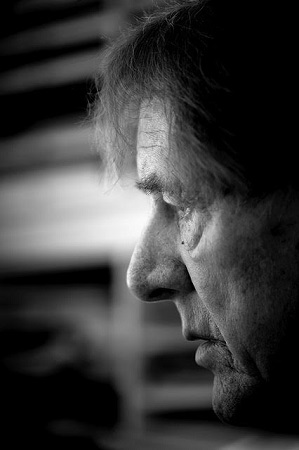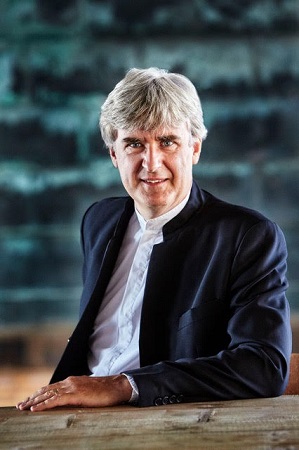We had music from the end of two composers’ careers, poised against music
from the early period of another, and yet there was considerable overlap,
even symmetry, to be heard. Nørgård’s Third might steal, like a magpie,
from any number of contemporary and classical idioms - and for a European
symphony it acknowledges elements of American music, too - but it also
abounds in a harmonic, even polyphonic, language, that would have been
fully recognisable to both Wagner and Strauss.
The concert opened with the Prelude to Act I of Wagner’s Parsifal.
Thomas Dausgaard is one of those interesting conductors who sets very
fluid, some might argue hasty, tempos for almost all the works he conducts
and yet the effect tends to be rather the opposite. It’s a skilful art for
a conductor to have, and it worked beautifully for the Wagner. I’ve always
thought this particular prelude from a Wagner opera the most difficult to
bring off in concert - one recalls Nietzsche’s quote that this music “is
the sort of thing to be found in Dante, and nowhere else” - and most
performances do seem to sink into some kind of Dantesque quagmire. The
best, on the other hand, tend to treat the music with great suppleness,
looking inwards rather than being self-consciously controlled or
over-grandiose. It’s true that the strings of the BBCSSO didn’t always have
the lushness or depth of tone one might have craved, but the brass were
magnificent, peerlessly golden-hued, and were careful to phrase their
notes. There is a thin line in this music between playing that is refined
and tinged with beauty - and playing that simply seems civilized. Dausgaard
very much drew the former from his orchestra, even in the Prelude’s most
powerful moments, such as the ‘Faith’ theme. This was a performance that
managed to achieve tension, depth and spirituality.
I’m not really sure that Strauss’s Vier Letze Lieder, sung by the
Swedish soprano Malin Byström, really managed to demonstrate her artistry
as a singer, nor the sheer greatness of these songs: this was a performance
that was both understated, and all but swallowed whole by the cathedral
that is the Albert Hall. Here we have music of ravishing humanity that is
born from the destruction and annihilation of a Germany - and Europe - in
ruin; music that is unashamedly late Romantic, music that refuses to
embrace the brutalism and atonality that would seduce other European
composers post-1945 attempting to draw a line under that very culture that
had been implicated in the terror of war and the Holocaust. But these are
songs that also look forward, even if the music doesn’t: they are about
rebirth and renewal, a reflection on decay and the past. They are about
serenity and love; life and death.
Although there can be no doubt whatsoever that Strauss had in mind these
songs should be sung by a soprano, it’s much less clear what kind
of soprano voice he was writing for. The composer specifically asked for
Kirsten Flagstad to give the premiere, though it would be crude to suggest
this is the only kind of sound he imagined; the orchestration, and even the
settings of the poems by Hesse and Eichendorff, don’t easily sit with one
type of soprano as decades of performance have revealed. ‘Frühling’ can be
a notable problem - and it was here. Byström’s dark, tenebrous voice felt
notably chilly, even distant. I found the lack of colour a little
unappealing, this song’s curving lines less a barometer of the season in
which it’s set, more a prelude towards the rest of the cycle. She didn’t
settle into ‘September’ either - again, there was nothing really
distinctive about the intricate vocal writing - Byström rarely brought an
expansiveness to the text; a tendency to clip phrases only made us more
aware of the beautiful phrasing of individual instruments, especially the
horn writing - played outstandingly well here.
As is often the case with richer, darker voices in these songs ‘Beim
Schlafengehen’ and ‘Im Abendrot’ worked better: the autumnal, spiritual
depth of the poems is instilled with almost unbearable soul-searching in
the music. There is something unearthly about Strauss’s orchestration in
the former, though Dausgaard’s tendency to push forward with his tempi did
Byström few favours in the first two stanzas. Only after the magnificent
violin solo - which comes to epitomise the journey of the soul - did this
song become the marvel that it is, and only here did Byström really begin
to penetrate into the heart of darkness of this music, floating a wonderful
top B over the orchestra and holding it until it curved effortlessly into a
beautifully held pianissimo. ‘Im Abendrot’ was even darker, though
perhaps Byström didn’t really feel comfortable in the upper-most registers
of the voice and though Strauss is quite clear his soloist should sing
single syllables in parts of this final song the effect here was more than
a little peremptory.
 Per Nørgård. Photo Credit: Lars Skaaning.
Per Nørgård. Photo Credit: Lars Skaaning.
Despite having been born in 1932, Per Nørgård’s music has been scandalously
underplayed at the Proms (though he’s doing rather better than the great
Swedish symphonist, Allan Pettersson, who has yet to have any of his music
played here, despite having died in 1980). Written between 1972-75, and
premiered by Herbert Blomstedt in 1976, the Third is a titanic work, and
the first of his symphonies to use choral forces. This is music that
derives part of its inspiration from Nørgård’s Nordic forefathers, Sibelius
and Holmboe, but it also owes a debt to late Mahler, and even to the early
influence, that was to be absorbed into his later work, of the Swiss artist
Adolf Wölfli, who spent much of his life in a psychiatric hospital, and
from where so much of the undiluted chaos and unrepressed changes of mood
in the music evolve. Nørgård’s music - especially the Third - differs
markedly from that of Pettersson’s in one crucial sense: they might share a
close tonality, even a common polyphony, they might also share a ferocity
that can lead to climaxes that are shattering and then melt into serene
tranquillity and unease, but Nørgård’s music simply isn’t driven by the
same sense of lacerating despair, hypnotic bleakness or sheer terror that
makes hearing a Pettersson symphony such a grim experience. Whether that is
a plus is a matter of opinion, of course.
Indeed, Nørgård’s Third is inflected with American jazziness, jagged Latin
rhythms and even mediaeval polyphony; it borrows from many different
cultural identities, though you’ll find this musical appropriation solely
at the service of the larger picture. The symphony opens on an ascent, a
thundering piano chord that leads the music into a complex series of
sections based on the “infinity series” - that is, endlessly similar music
comparable to fractal geometry, though with the Third, as opposed to the
Second Symphony from 1970 which was only based on part of the series, this
symphony incorporates an infinity series that utilizes melody, harmony and
rhythm. The climaxes become earth-shattering, underpinned by orchestration
that includes the rumbling pedals of an organ (sounding suitably seismic in
the Albert Hall, almost as if the earth’s crust had been ripped open). With
the opening of the second movement, where the ideas splinter into a myriad
of opposing directions, the music goes into a descent with it moving
towards complete stillness. The ear picks up any number of details from the
orchestra - the veiled ringing of cymbals that sound like rustling tinsel,
the ghostly tolling of bells that fade into nothingness, the skeletal
chiming of the xylophone sounding like broken bones, the spectral string
harmonics that are played almost on the bridge of the instrument.
Perhaps inspired by his early 1970s opera, Gilgamesh, much of the
final movement of the Third Symphony is taken up by a mixed chorus. It
completely changes the aural picture of the work, drawing on Rilke’s ‘Singe
die Gärten’, from his Sonnets to Orpheus and then at the end of
the symphony a quotation from Schubert’s ‘Du bist die Ruh’, from Friedrich
Rückert. You hear individual voices, as well as the combined choirs, giving
the music a truly polyphonic texture.
Dausgaard - who gave the UK premiere of Nørgård’s Sixth Symphony at the
Proms in 2002 - gave a compelling performance of the Third (though he has
recorded the work in Denmark), and secured highly polished and brilliantly
committed playing from the BBCSSO. The London Voices and National Youth
Chamber Choir of Great Britain sang expertly, and solo voices were often
thrilling. Only the almost universal inaudibility of the text diminished
the otherwise sublime foundations on which much of the performance was
based.
This is a symphony that sounds complicated, yet it is both cogent and
direct. It is a work that embraces modernism, but is entirely founded on
contemporary and classical models. It radiates emotion and depth of
feeling, though in a somewhat incongruous way. The 86-year-old composer,
who was present for this premiere, had good reason to be pleased with this
concert - certainly one of the most note-worthy first performances of this
year’s Proms.
Marc Bridle
PROM 51: Richard Wagner - Parsifal, Prelude to
Act I; Richard Strauss - Vier Letze Lieder; Per Nørgård - Symphony
No.3 (UK premiere)
Malin Byström (soprano), London Voices, National Youth Chamber Choir of
Great Britain, BBC Scottish Symphony Orchestra, Thomas Dausgaard
(conductor)
Royal Albert Hall, London; 20th August 2018.

